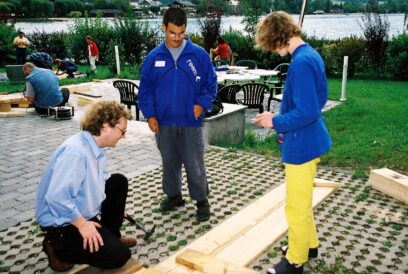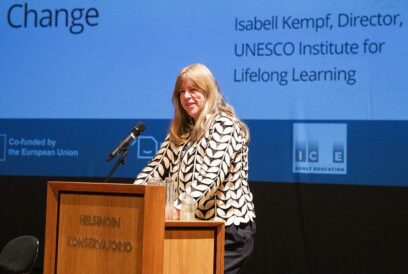

Despite abundant research into clinical therapy, science cannot ultimately describe all what happens in successful meetings. / Photo: Milada Vigerova on Unsplash
Despite abundant research into clinical therapy, science cannot ultimately describe all what happens in successful meetings. / Photo: Milada Vigerova on Unsplash
Therapy is a journey of self-discovery for the patient, but before this can happen the therapist will have learned to use the central tool of the trade – his or her own psyche.
Niko* falls silent, but not to think further. Rather, perhaps, to find the exact words to crystallize years of experience of people´s minds.
“Humans are social beings. That defines us. Mental health problems mostly arise out of our relationships to others. Equally, we need each other to get well again.”
Niko is a gentle-looking man in his early forties, living in the Helsinki area, Finland, with his family. He works as a municipal mental health nurse in outpatient care, dividing his working hours between home visits, surgery hours and guiding various groups.
He is also an adult student, in his second year of a three-and-a half year programme to become a psychotherapist.
A therapist benefits from all of his life experience. In my life I have experienced what it is like to be helped, too.
This career step grows naturally out of Niko´s previous experience first as a practical nurse in mental health and substance abuse care and later as a nurse. The future career choice is an emotional one, as well.
“A therapist benefits from all of his life experience. In my life I have experienced what it is like to be helped, too. I believe this enables me to meet my patients as equals”, Niko says.
He recognizes he has a calling to help people struggling with their mental health.
“I identify strongly with the therapists I’ve known in my life. Especially the therapist I visited when I was young – I still cherish his image as a sort of a paragon of a calming, understanding and accepting person”.
Therapist students are mature learners
Niko´s study programme of adult cognitive psychotherapy is offered at the University of Helsinki. It is delivered as part-time study and consists of a combination of thematic seminars and independent study, therapy training sessions, monthly work guidance and receiving psychotherapy, both in group and one-to-one.
University lecturer, psychologist and psychotherapist Jari Lahti is one of the instructors on the course. He is responsible for guiding would-be-therapists into their common profession.
“Our education consists of theoretical knowledge of the human psyche, placed in the context of practical therapy. Very central to the training is to learn to reflect on one´s own actions, emotions and thinking”, Jari Lahti sums up.
According to Lahti, the student material on his course is varied but one thing is common. The therapist students are invariably mature students with work and life experience under their belts. A suitable previous degree in care or a relevant field is an admission requirement of the course and that alone determines the more mature age of the applicants.
“Having already some life experience is an advantage for our students”, Lahti says firmly.
“A therapist´s most important tool is their own personality”, he continues.

The therapist students are invariably mature students with work and life experience under their belts. / Photo: Ambitious Creative Co. – Rick Barrett on Unsplash
Self-reflection is key to helping others
In a therapy session the therapist processes and ultimately understands the customer´s situation through his or her own experiences, in addition to professional theoretical knowledge.
According to Lahti, some therapists focus strongly on the patient´s emotions to get to the root of the problem at hand, some stress more the cognitive aspects of the psyche, some emphasise the social dimension.
These emphases arise from the therapist´s own background and psyche, Lahti explains.
“Blind spots may accompany these orientations. The blind spots are unique to every therapist”, he continues.
In a therapy session, the therapist must recognize the key moments when the patient´s ‘sensitive core is open’
The blind spots, Lahti elaborates, are topics, experiences and areas in the patient´s life that strike a painful chord in the therapist him or herself. This pain may be so acute that the therapist may avoid some discussion topics with the patient or will not dig deeper into some emotional terrain.
Therein lies a danger. In a therapy session, the therapist must recognize the key moments when the patient´s “sensitive core is open”, as Lahti puts it. When the patient is open and trusts the therapist, the patient and the therapist may, with the right questions, get access to the root of whatever problem they try to solve.
“That window of opportunity may be open for a few moments and the therapist may miss it if his or her beliefs or feelings come in the way”, Lahti explains.
Hence, during psychotherapist training, the students are guided to understanding, not just the patients, but themselves. This is possible through the theoretical insight gained, but also by going through psychotherapy themselves.
Students give and receive therapy
Niko has already carried out over a hundred therapy sessions as a trainee therapist. He describes feeling nervous at the first meetings but now feels he is starting to find his own way of working. In his work guidance sessions, he can talk openly about the feelings and situations arising in these training sessions Nevertheless, the entire programme is a mentally taxing process.
“Most peculiar thoughts crowd your mind when you constantly read up on such a variety of mental phenomena. Our trainer prepared us for this and said it is all part and parcel of the process”, Niko describes.
Some patients are so rational that I need to find a way to their emotional level to get ahead. Others need more structure so as not to wallow in emotions all the time
Niko feels that the therapist training and the associated constant work guidance have heightened his abilities for self-reflection. He listens closely to the feelings and thoughts that a patient awakens in him and regards them as meaningful signals about the patient´s problems or the therapy situation itself. Often the very reasons a patient seeks out therapy somehow bleed into the therapy relationship.
“It is my challenge to spot how the patient´s problems are visible in our clinical relationship and offer a rectifying experience, built on trust. For example, some patients are so rational that I need to find a way to their emotional level to get ahead. Others need more structure so as not to wallow in emotions all the time”.
Trainees receive their own individual and group psychotherapy during the training. Niko thinks this helps in relieving the effects of a quite stressful training.
“Sharing my life story to a small group of fellow students in our group therapy was a powerful, touching experience. My own personal challenges felt more normal and commonplace, even though everyone has their unique story.

The personal positive chemistry between therapist and patient is crucial to turning therapy into a life-affirming learning process. Those who seek out therapy are encouraged to look for a therapist that they feel comfortable working with: and keep looking if they are not satisfied. / Photo: Federica Campanaro on Unsplash
The X factor
If psychotherapist education is a journey towards self-reflection for the therapists-to-be, the same applies to the patients. Both Niko and Jari Lahti view therapy as a learning process for the patient.
During therapy, therapist and patient gradually try to find words to describe the patient´s experience and to share understanding on the factors that maintain the problematic experiences and that have caused them.
In therapy we do not feed answers to the patient. Rather, we help them find their own solutions, together, with a curious attitude.
In psychotherapy terms, this is called conceptualization. With better understanding comes possibilities to realize what needs to be changed and how. Ideally, the patient learns to understand his or her current thoughts and emotions, often in the context of their entire biography, including experiences in childhood.
The aim of therapy is to learn more functional ways to deal with oneself and life: changes in thinking, emotions and behaviour that lead to concrete positive change in the life and social relationships of the patient.
“In therapy we do not feed answers to the patient. Rather, we help them find their own solutions, together, with a curious attitude”, Niko stresses.
But why does therapy work, when it does work?
For Jari Lahti, therapy is a mixture of “science, courage, trust and art.” Successful therapy and, ultimately, healing grows out of this mix.
Science in the equation refers to knowledge of the psyche and use of tried and tested clinical methods. Courage, for Lahti, means that both therapist and patient must take the leap into the sometimes scary process of self-reflection and -discovery.
“Then we have trust. It is the lifeblood of therapy. The therapist must project trust and empathy towards the patient for therapy to be successful.”
How does Lahti´s fourth element, art, figure into this recipe?
“With art, I refer to the creative element in therapy. Despite abundant research into clinical therapy, science cannot ultimately describe all what happens in successful meetings. This is because the process has such complexity with factors like personal chemistry, trust and events not-related to the therapy situation. It is a creative, organic process.”
Niko agrees:
“I´ve come to think of mental health as a sufficient absence of mental suffering, accepting that a certain degree of suffering is integral to life. To paraphrase Freud, our mental health is sufficient when we are capable of “love and work”. A meaningful life with meaningful relationships to fellow humans.”
*Niko´s name has been changed.
European qualifications for psychotherapists vary
In Finland, the country discussed in this article, the psychotherapy profession and professional title are protected by law and entry into the profession is currently possible only through university-level continuing education. Similar requirements exist in many other European countries such as Germany, France and the UK.
This does not, however, mean that a European professional psychotherapist could automatically practice the profession in any other EU country.
“To date there is no common law in the European Union regulating the psychotherapy profession. The requested qualification standards for working as a psychotherapist differ from country to country”, confirms Nataliya Tereshchenko from the European Association for Psychotherapy (EAP).
The EAP is an umbrella organization for psychotherapist organizations, including national and European organizations. One of the goals of the EAP is creating pan-European training standards for psychotherapists.
To this end the EAP provides the European Certificate for Psychotherapy (ECP) for individual psychotherapists. The Certificate is a step towards common standards within the Union.
-We issue the Certificate only to psychotherapists with a high standard of psychotherapy training. Some governmental bodies have already accepted the ECP as a proof for a profound educational background, regular supervision and practice. However, it does not guarantee the right to practise in any country within the European Union, Tereschenko explains.
Sources:





